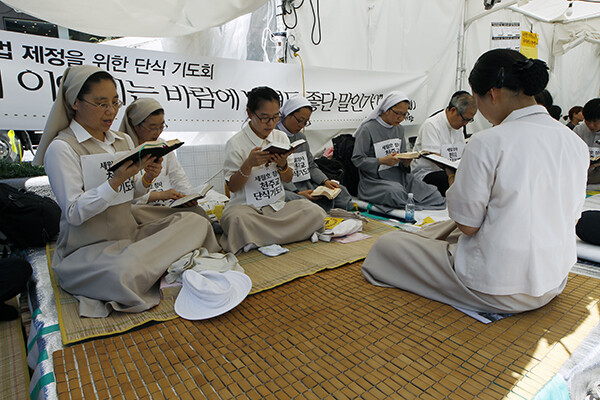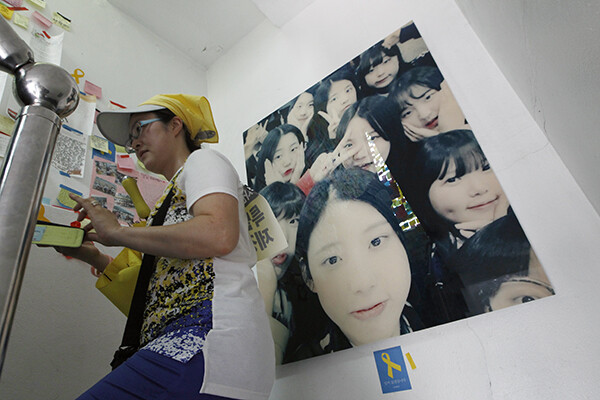hankyoreh
Links to other country sites 다른 나라 사이트 링크
Human rights commission sides with police who impeded Sewol fasting and meetings

Priests and nuns with the Catholic Priests‘ Association for Justice (CPAJ) held daily fasting and prayer meetings last August calling for an investigation and special law on that April’s Sewol ferry sinking, which claimed over 300 lives. After the meetings ended, they would walk 1.5 km to Seochon Gallery to look at work by one of the victims, a Danwon High School student and aspiring designer named Park Ye-seul.
On four separate occasions, police blocked the priests, nuns, and civic group members along the way. By traveling in a group wearing 8-1/2" x 11" pieces of paper, reading “Sewol tragedy fasting and prayer meeting” and “One-day public fast,” they charged, the participants were engaging in an “illegal unreported march.”
The police instructed them to remove the paper signs and walk individually rather than as a group. The priests and nuns accepted the order without resisting, but later filed a complaint with the National Human Rights Commission charging the police with “unfair restrictions on movement.”
“We were simply walking, without chanting any slogans or carrying any demonstration paraphernalia, and it was unjust for the police to stop us,” they claimed in the complaint.
On June 23, the commission announced that it was rejecting the complaint, saying the police officers‘ activity was “a legitimate exercise of duty in accordance with the Assembly and Demonstration Act” and “did not constitute a violation of human rights because the participants were able to travel to their destination after agreeing to the police’s orders and removing the paper signs.”
Human rights groups responded to the decision siding with the police by criticizing the “issues with the commission members’ perceptions of freedom of expression.”
“They’re saying that it wasn’t a human rights violation because [the participants] took off their own paper signs, but it was the police who made them do that,” said Myeong Sook, a member of Sarangbang Group for Human Rights.
“They don’t seem to understand the process or results of human rights infringement,” Myeong added.
Korea Human Rights Policy Institute director Kim Hyung-wan argued that the commission “should base its decisions on the standards of human rights rather than positive law.”
“If the judgments are simply going to be based in positive law, they should be left to the courts,” Kim added. “You have to ask why we even have a National Human Rights Commission.”
Commissioners Kim Young-hye, Yoon Nam-geun, and Choi Yi-woo took part in the decision.

By Choi Woo-ri, staff reporter
Please direct questions or comments to [english@hani.co.kr]

Editorial・opinion
![[Column] Park Geun-hye déjà vu in Yoon Suk-yeol [Column] Park Geun-hye déjà vu in Yoon Suk-yeol](https://flexible.img.hani.co.kr/flexible/normal/500/300/imgdb/original/2024/0424/651713945113788.jpg) [Column] Park Geun-hye déjà vu in Yoon Suk-yeol
[Column] Park Geun-hye déjà vu in Yoon Suk-yeol![[Editorial] New weight of N. Korea’s nuclear threats makes dialogue all the more urgent [Editorial] New weight of N. Korea’s nuclear threats makes dialogue all the more urgent](https://flexible.img.hani.co.kr/flexible/normal/500/300/imgdb/original/2024/0424/7317139454662664.jpg) [Editorial] New weight of N. Korea’s nuclear threats makes dialogue all the more urgent
[Editorial] New weight of N. Korea’s nuclear threats makes dialogue all the more urgent- [Guest essay] The real reason Korea’s new right wants to dub Rhee a founding father
- [Column] ‘Choson’: Is it time we start referring to N. Korea in its own terms?
- [Editorial] Japan’s rewriting of history with Korea has gone too far
- [Column] The president’s questionable capacity for dialogue
- [Column] Are chaebol firms just pizza pies for families to divvy up as they please?
- [Column] Has Korea, too, crossed the Rubicon on China?
- [Correspondent’s column] In Japan’s alliance with US, echoes of its past alliances with UK
- [Editorial] Does Yoon think the Korean public is wrong?
Most viewed articles
- 1‘We must say no’: Seoul defense chief on Korean, USFK involvement in hypothetical Taiwan crisis
- 2Will NewJeans end up collateral damage in internal feud at K-pop juggernaut Hybe?
- 3[Column] Park Geun-hye déjà vu in Yoon Suk-yeol
- 4Why Korea shouldn’t welcome Japan’s newly beefed up defense cooperation with US
- 5Thursday to mark start of resignations by senior doctors amid standoff with government
- 6N. Korean hackers breached 10 defense contractors in South for months, police say
- 7[Guest essay] The real reason Korea’s new right wants to dub Rhee a founding father
- 8[Column] ‘Choson’: Is it time we start referring to N. Korea in its own terms?
- 9Kim Jong-un expressed ‘satisfaction’ with nuclear counterstrike drill directed at South
- 10[Editorial] New weight of N. Korea’s nuclear threats makes dialogue all the more urgent